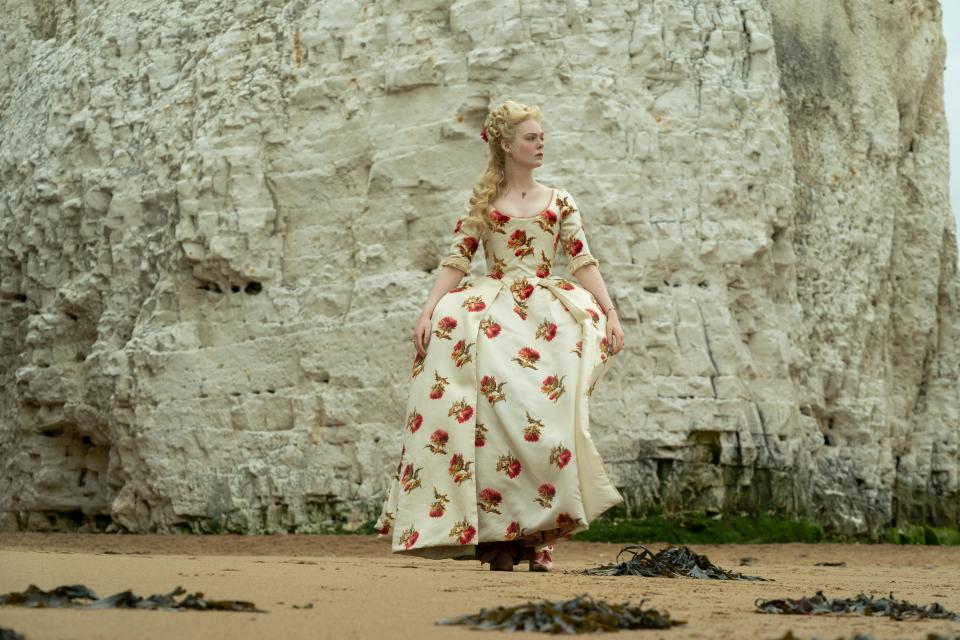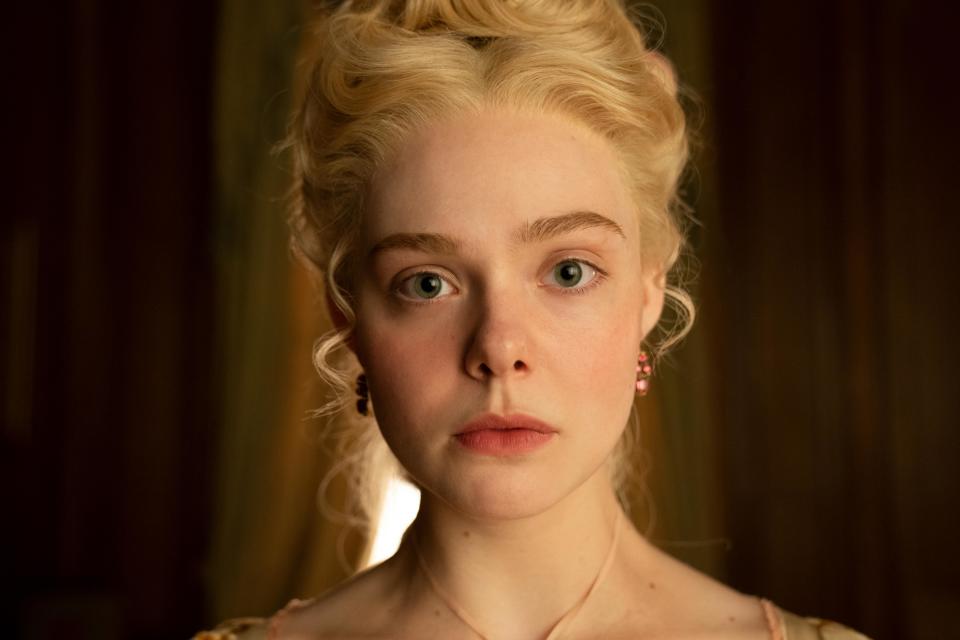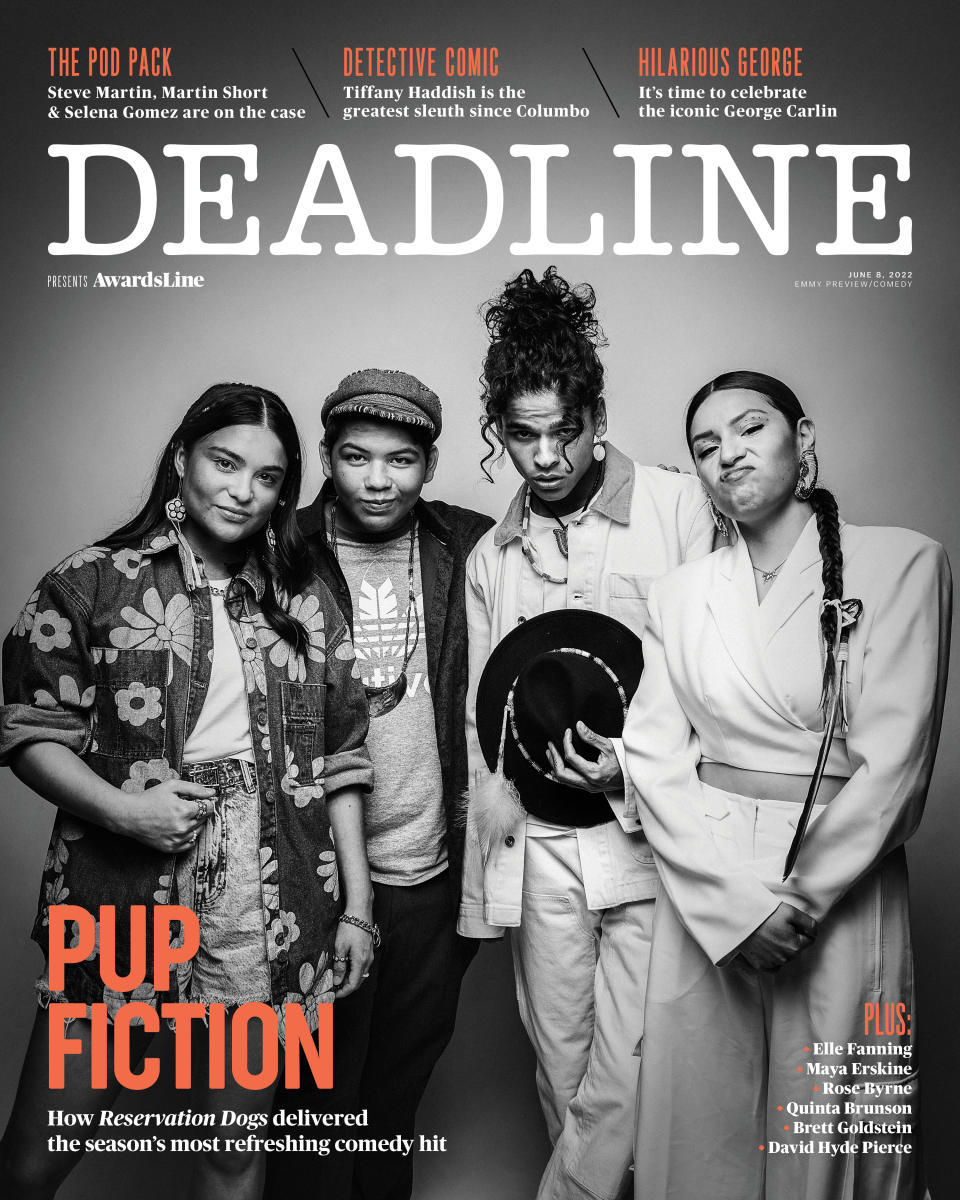Elle Fanning: Producing On ‘The Great’ & ‘The Girl From Plainville’ Helped Her Find Her Voice
- Oops!Something went wrong.Please try again later.
- Oops!Something went wrong.Please try again later.

Having acted since the age of two, Elle Fanning is a unique kind of veteran. Now, at 24, she knows her way around a set but still has the energy and fervor to take on new challenges, such as producing the shows she stars in, something she began doing in 2020 with The Great, followed by this year’s The Girl from Plainville, which is based on true events. The Great will soon start filming its third season. For Fanning, these roles have kept her on her proverbial toes, while allowing her to expand her skills as a producer.
DEADLINE: You were a producer on The Great. What has producing taught you about your profession that you maybe didn’t know before?
More from Deadline
ELLE FANNING: I think I’m still learning in that aspect of being behind the scenes, but it’s always something that I’ve been really drawn towards. I think being a child actor, you grow up on film sets, but watching everyone else around you, watching other people make the decisions and put things together, and so I’ve always been fascinated by that. So now that I get to pull back the curtain and be in those rooms and be a part of conversations that I normally wouldn’t have been, I’m really happy in that place. I do thrive when I can get creative and strategize and think of the best way that we can put this show together.
The editing room for me, I was in it a lot during The Girl From Plainville, and I really enjoyed the editing process. The postproduction of it all and how editing can change so much if you just flip things around and choose other takes, and the nuance of that, I really loved. I’ve definitely grown into my voice. Weirdly, like, The Great and playing Catherine has helped me with that because she’s a young woman, and a lot of the time, is not looked on with the greatest respect. Learning from how Tony [McNamara, screenwriter] writes her and being able to, I don’t know, speak my mind. Especially because I have to remind myself, I am obviously very young and still learning, but at the same time, I’ve been acting since I was two. So, in a lot of ways, I think people like to think, “Well, you’re young, you don’t know.” It’s like, “Well, you know what, maybe I do this time?” Just learning to speak up and building that confidence, I’m enjoying that.
DEADLINE: You say that playing Catherine has helped you find your voice a bit more—how so? Are there any moments you can point to?
FANNING: She’s helped me so much. It’s a significant role in my life and career, it’s just very special… One of the scenes in the second season I had the idea to do this, and Tony allowed me to, but we needed something to show that Catherine was trying to have a good time, and what was her drunken party trick [while still being pregnant]. And, obviously, I loved having the pregnancy belly because I could use it for so many different things, and to have physical comedy. I’m not going to have it this year, but I did enjoy it. But I came up with the idea of, “What if I do a bridge because I can do a back-bend and serve macaroons on my stomach as a table?” And Tony’s like, “Perfect. That’s great.” Then you’re in that moment, you’re like, “What am I doing, this is my job?” But it served the show right.

Gareth Gatrell/Hulu
DEADLINE: Having started so young, what keeps you motivated?
FANNING: There is so much that I have done obviously, but to me there’s still so much that I haven’t. I love challenging myself, like from The Great to Plainville, I only had two weeks in between shooting, and these roles probably could not be more different. So, the challenge of that and being able to shock people. I’ve always loved to prove people wrong [about] the box that they want to put me into. And a lot of the times too, I pick projects because it’s a director or actors that I want to work with that I never have, and I feel like that list is still endless for me. And you can feel the acting muscle growing, I do believe that it is a muscle, and you can feel it cracking open.
And I think with these two roles specifically, I feel it even cracking open more; of just being willing to be daring and put yourself out there. It sounds cliché, but the set is the place that I feel the most comfortable, and feel the most myself and also not myself, which makes me maybe most myself. I want to produce more, I do feel now that I can find books and stories that I like, or articles. My ears and eyes are always open for material, which when you’re younger they’re not as much.
DEADLINE: Does producing make you want to go any further, like directing?
FANNING: I would love to direct. It is a big dream of mine, for sure. Yeah. I will one day. I don’t know. Not soon, but I will one day, 100 percent. I definitely feel that itch.
DEADLINE: In the pilot episode of The Girl from Plainville, you give a look that sets the story in motion. How did you get under Michelle’s skin?
FANNING: That scene definitely was a big standout when you read the scripts, and it’s the moment where you start to question Michelle’s intentions. For me, taking on a part like this, obviously she is a real person, but you have to distance yourself and not get bogged down by the fact that you are playing a real person—who I didn’t have access to; I didn’t feel like it was appropriate to talk to her and there’s not much recording of her, there’s the courtroom sequence, but that’s just one phase in her life. So, we have these seven years where we follow her, and she just has so many different faces, and I think is so many different people. Really what clicked for me to get into the role was her obsession with Glee and Fault in our Stars, and that YA world. She was someone who I believe was extremely isolated and felt very alone in the world, and really was constantly seeking attention. I think her watching Glee and reading those YA novels and watching those movies was the way for her to be able to be the star of her own show and finally get the attention that she really desperately wanted.
I think in that moment, it’s such an inception of a scene because Lea Michele is grieving her real-life boyfriend, but also acting as Rachel on the show, grieving a character who passed away in real life. Then Michelle, in a way, is emulating grief, which is what is so eerie about it. So, I was verbatim matching Rachel’s emotions in that scene and trying to emulate it exactly, because I think the more that it looked like I was copying, the more eerie that it would feel and what was needed for the end. And the smile at the end, I remember in the script it said, Michelle feels like she’s nailed the performance, but I also felt, as Elle, I felt like I had gotten it right. So, part of it was honestly Elle, feeling like I had nailed it, and that’s what came out of it. But I think the smile, it’s like, “Whoa, wait, is she really upset that he has passed away, or is this a completely orchestrated manipulation?” Which is obviously a big question throughout the whole series.

Gareth Gatrell/Hulu
DEADLINE: The character is based on a real person so how much did you imagine versus the facts you knew about her?
FANNING: I think you have to really rely on the people around you, and in our case, Patrick Macmanus and Liz Hannah, our showrunners, and Liz got to direct a couple of episodes, and she’s a really close friend of mine and we’ve worked together before. So being able to lean on them and knowing that they can also later calibrate the performance to what it needs to be. Because I think for me, Michelle—at least our Michelle—there’s nothing more dramatic in life really than a teenage girl. So, she is a teenage girl, but then also her dramatics are very much heightened, as a person. So, I think it was calibrating when I wanted to push her dramatics, and when I felt like it needed to be real emotion, which there’s a difference there.

So, it was every day figuring that out. The show really plays with fantasy a lot, and as an actor I’m someone that lives in a fantasy world a lot of the time, and I have to remind myself to stay grounded. With Michelle, she thrives in her fantasy, and with technology you can create a whole fantasy world for yourself. I really loved doing those texting moments with Colton [Ryan], who plays Conrad. Because texting can be a really boring thing to watch onscreen, but I think for us, it was important to have them together, to show that was the real relationship. They only met a handful of times, and to them both, it felt very real.
Best of Deadline
2022-23 Awards Season Calendar - Dates For The Oscars, Emmys, Tonys, Guilds, Festivals & More
Awards Season Red Carpet Photos: Grammys, Oscars, SAG Awards & More
Sign up for Deadline's Newsletter. For the latest news, follow us on Facebook, Twitter, and Instagram.

